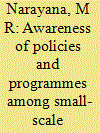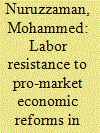| Srl | Item |
| 1 |
ID:
073319


|
|
|
|
|
| Publication |
2006.
|
| Summary/Abstract |
Small-scale industries (SSIs) have been important for India's economic development due to their contribution to production, employment, exports, and investments in the private sector. National- and state-level economic reforms since July 1991, and India's commitments to honouring the disciplines under World Trade Organization (WTO) agreements since January 1995, have added new policies and programmes for promotion, regulation and development of India's SSIs. Full awareness of the policies and programmes for all the SSIs has been an essential requirement to exploit the opportunities and meet with challenges under these policy regimes. In the light of this requirement, this article analyses the nature and extent of awareness of select policies and programmes under the new policy regimes in India, based on a case study (or sample survey in 2001-2) of 373 manufacturing SSIs in Karnataka State (India). The empirical results: (1) offer evidence for spatial variations in the awareness by policies and programmes and by sector-specific WTO agreements; and (2) imply a policy need for effective awareness programmes as a precondition for equalizing the benefits of new policy regimes for all the SSIs. The results and implications of this case study are of relevance for design and implementation of current and future awareness policies for the SSIs at the national and sub-national levels in India as well as in other developing countries.
|
|
|
|
|
|
|
|
|
|
|
|
|
|
|
|
| 2 |
ID:
073321


|
|
|
|
|
| Publication |
2006.
|
| Summary/Abstract |
A significant portion of the current debate on secularism has focused on Nehru's role in conceptualizing and institutionalizing this concept. Supporters of the Nehruvian legacy of secularism applaud him for adopting this policy and for establishing communal harmony. Critics hold Nehru responsible for the problems associated with secularism. This article assesses the significance and consequences of Pandit Nehru's contributions to secularism by carefully examining the track record of his government in this area. My main argument is that Nehru deserves credit for introducing secularism to a people who were inured to discriminatory, anti-minority views and practices for centuries. However, he failed to institutionalize this policy in the polity and civil society. I posit that though Pandit Nehru faced formidable opposition to his secular policies from Hindu conservatives within the Congress and the Hindu nationalists outside, he could have pursued several, long-term, non-confrontational strategies for institutionalizing secularism. His failure to do so blemished what would otherwise have been an abiding contribution to Indian multiculturalism.
|
|
|
|
|
|
|
|
|
|
|
|
|
|
|
|
| 3 |
ID:
073320


|
|
|
|
|
| Publication |
2006.
|
| Summary/Abstract |
Pro-market economic reforms enjoy less social support in most developing countries, including Bangladesh. Labor response to reform policies, in particular, has been quite unfriendly and often violent. This article analyzes labor resistance to pro-market economic reforms in Bangladesh in the decades of 1980s and 1990s. It explores the underlying causes that spurred labor resistance to market-oriented reforms, examines the successes and failures the resistance achieved or recorded and arrives at the conclusion that the spate of labor resistance in the industrial sector in the 1980s and 1990s had the potential to halt or roll back the reform program but it did not succeed due to a host of factors, including workers' disunity, ideological divide between various trade unions, lack of organizational structure, control of pro-reform national political parties over their respective trade unions, the diminishing influence of leftist trade unions in labor politics and the lack of an alternative leftist political agenda in Bangladesh politics. The leftist failure to organize workers and launch a collective movement against pro-market forces apparently promises a better future for market-oriented reforms in Bangladesh.
|
|
|
|
|
|
|
|
|
|
|
|
|
|
|
|
| 4 |
ID:
073318


|
|
|
|
|
| Publication |
2006.
|
| Summary/Abstract |
As part of the structural adjustment programme the Government of India, in 1997, introduced the Targeted Public Distribution System (TPDS) with the objective of targeting the food subsidies to the poor and reducing fiscal deficit. While the universal Public Distribution System (PDS) had several limitations, the Targeted PDS has only worsened the problem of 'adequate access to food' for the poor. This article examines the limitations of income targeting based on the official poverty line under the TPDS. The article argues that the TPDS has worked counter-productively to the policy objective of reaching the poor. As per the National Sample Survey (1999-2000) and the National Family Health Survey (1998-9), a significant proportion of the poor and food insecure suffer from severe malnutrition and calorific deprivation. With a large section of the population falling out of the TPDS the article suggests policy alternatives to ensure better 'access to food' for the poor and vulnerable.
|
|
|
|
|
|
|
|
|
|
|
|
|
|
|
|